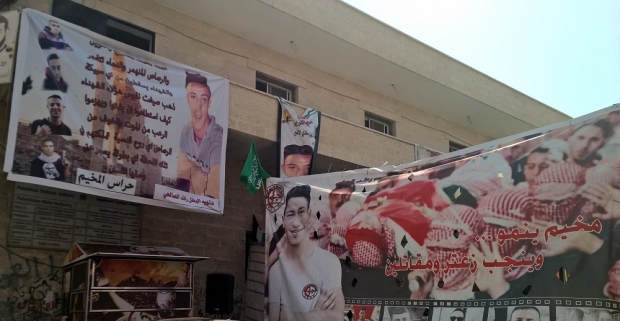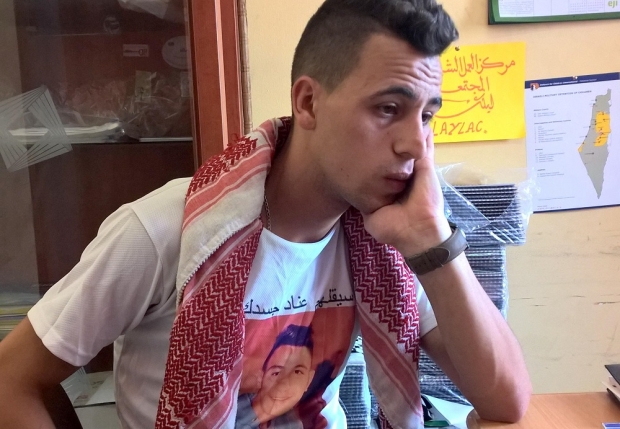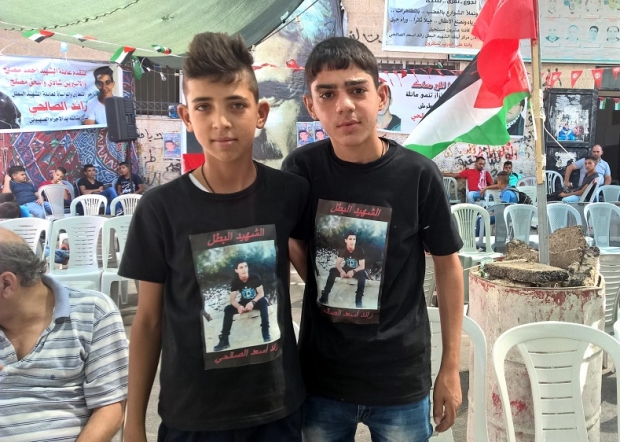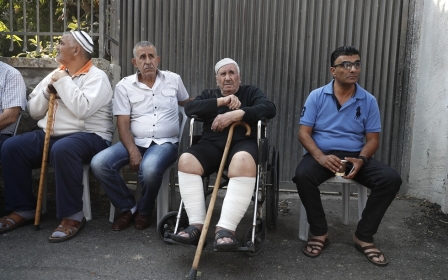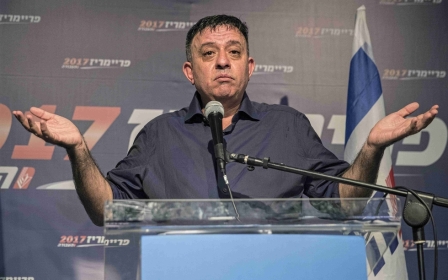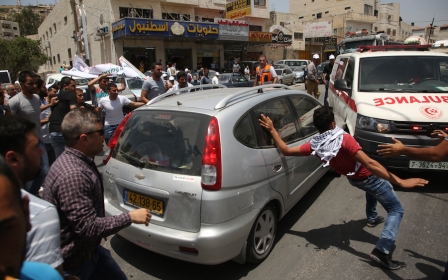Raed al-Salhi, another Palestinian life of promise snuffed out by Israel
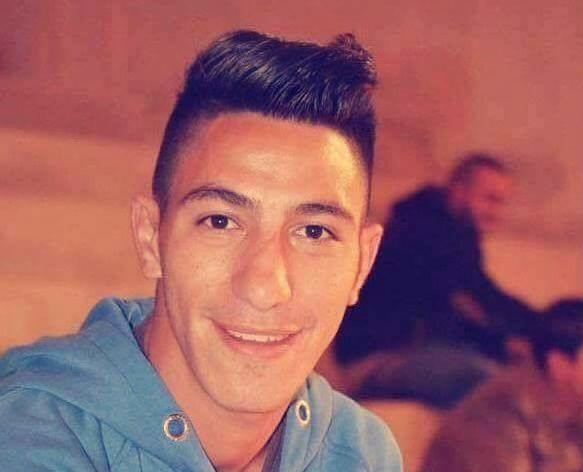
DHEISHEH, Occupied West Bank - Raed al-Salhi had big plans. Over the summer, the 21-year-old resident of al-Dheisheh was finalising a project he and several friends had come up with to set up a number of small libraries across the Bethlehem-area refugee camp in the southern occupied West Bank.
"Raed was reading all the time and tried to push young people to be closer to books," Naji Owdah, the director of Laylac community centre in Dheisheh, who worked closely with the young man for months on the project, told Middle East Eye.
"Raed was from one of the very poorest families in the camp... but he wanted to help the people as much as he could, and to educate them more," Owdah added. "I saw this very clearly."
He wanted to help the people as much as he could, and to educate them more
- Naji Owdah, Dheisheh community leader
But just as he was set to make his project become a reality, Raed was shot and fatally wounded by Israeli soldiers. His death left his refugee camp, which has seen many of its youths killed or crippled by Israeli forces, angered and devastated.
Dying for 25 days in Israeli custody
On 9 August, Raed was shot several times by Israeli forces outside his home during a night-time military raid.
Soldiers tore the bleeding young man away from one of his brothers as they tried to take him to safety. The brother was arrested.
His family has denied Israeli army claims that Raed was shot while attempting to flee. They say that Raed had simply hoisted himself above the wall of their home's courtyard to see where the soldiers were when he was shot.
For 25 days, Raed was in the Hadassah hospital in Jerusalem under armed guard, during which time his family was prevented from visiting and left in the dark about his condition.
A hospital report received by the Palestinian Committee of Prisoners' Affairs only read that Raed had suffered from "several gunshots," committee spokesman Akram al-Ayasa told Middle East Eye. More specifically, Aysa said Raed was shot in the chest, stomach, liver, and ankle.
We don't know what to feel, there is nothing left to say or feel
- Khaled, Raed's brother
On 3 September, Raed died. For five long days, his grieving family had to face another battle to press Israel to release his body.
The Palestinian Committee of Prisoners' Affairs officially took the case to the Israeli Supreme Court on Thursday, with Israeli authorities announcing that evening that Raed's body would be released the following day.
With the body's return planned for Friday evening, Raed's funeral is scheduled to take place on Saturday following medical examinations.
"His mother is not aware of what is happening now," Ishaq al-Salhi, Raed's 60-year-old half-brother, told Middle East Eye while clutching his cane at Raed's mourning tent in Dheisheh.
"She doesn't believe that Raed died, she keeps asking when is he coming home, and keeps waiting for him.
"We don't know what to feel, there is nothing left to say or feel," Raed's 24-year-old brother Khaled said.
"Maybe we are all smiling in front of people and pretending like nothing is wrong, but believe me that is not true. Each one of us is collapsing and bleeding deep down.
"All what we care about now is to bury his body."
'A loving and loved boy'
Raed, whom his brother Khaled described as a cat lover who would rescue stray kittens from the street, much to his family's displeasure, was described by several Dheisheh residents as loved by the community.
Raed had also been a committed member of the Popular Front for the Liberation of Palestine (PFLP), the main Palestinian leftist political party, since he was 15, his half-brother Ishaq said, and was imprisoned by Israel for around four months in 2014.
"He was a good-hearted guy, he was always smiling and joking," Khaled said.
"Raed was my friend, of all of my brothers, he was the one I was closest to."
But Raed's death has been denounced as an example of the Israeli army's excessive use of force against Palestinians.
Lethal force in this case was neither proportional nor necessary
- Maya al-Orzza, Palestinian legal researcher
"Lethal force in this case was neither proportional nor necessary," said Maya al-Orzza, a legal researcher for Palestinian NGO BADIL.
"Raed did not pose any threat to the lives of soldiers, he was fleeing unarmed and could have been apprehended using other means,"
"This leads to the conclusion that Raed's death was an extrajudicial killing, and could also amount to the war crime of willful killing."
At least four residents of Dheisheh - all young men between the ages of 18 and 27 - have been killed by Israeli forces during army raids and subsequent clashes since the beginning of a wave of unrest across the occupied Palestinian territory in October 2015.
However, scores of youths from the refugee camp have been injured during the same time period as part of what has been denounced as a deliberate "shoot to cripple" campaign in Dheisheh and the nearby Aida and Azza refugee camps.
'Shoot to cripple'
"Captain Nidal," the alias of the Israeli army commander in charge of the Bethlehem area, is infamous for allegedly making threatening phone calls to young Palestinian men - including, according to relatives, Raed.
"This extrajudicial killing, when added to recent comparable killings in Dheisheh, the ongoing use of excessive force and intentional wounding of youth, the numerous arbitrary arrests and the threats, proves that these incidents amount to a broader policy of suppression of resistance," al-Orzza said.
Despite the longstanding Israeli military focus on Dheisheh, residents have been incensed by what they said was the Palestinian Authority and Palestinian media's lack of attention to Raed's case.
Social media outlet Dheisheh al-Hadath reported that PFLP would ban a number of Palestinian news outlets from Raed's funeral as a result.
"The media here is for the president [Mahmoud Abbas], not for the martyrs, not for the poor people, not for the camps," Hamdi Faraj, a resident of Dheisheh and columnist for al-Quds newspaper, said while inside Raed's mourning tent.
Faraj added that the PA "sometimes feel ashamed of the people struggling" against the Israeli occupation.
Who will be next?
In a community that has long been the target of Israeli military violence, Raed's death has served as yet another painful reminder for many Dheisheh residents that any of the camp's young men and boys could be the next victim of Israeli army violence.
"Sometimes the feeling comes to your mind when you try to be more and more close to these young people, and to open more windows (opportunities) for them, that they might die," Owdah said. "I've seen this with my family, with my nephews… the story repeats itself."
Compounding the grief of Raed's death, Israel's withholding of his body for five days marked only the latest instance of another well-documented Israeli policy, Ayasa told MEE.
Dheisheh camp is clearly a target
- Akram al-Ayasa, Palestinian Committee of Prisoners' Affairs
"This is collective punishment – not for the person who died, but punishment for his friends, his colleagues, his community, his family," he said.
"Dheisheh camp is clearly a target since there is a lot of activity against Israeli troops who are invading the camp. They want to show that they are in power, even in the centre of Area A," he added, referring to the 22 percent of the West Bank officially under Palestinian Authority control since the Oslo Accords.
The IDF told MEE on Thursday that it had begun a review of the incident which will be overseen by the IDF's Military Advocate General Corps.
"Recent Israeli actions towards Palestinian civilians cannot be considered as isolated incidents, but rather as the violent manifestations of a policy of lawlessness in which Israeli forces operate in repeated and direct contravention of international law absent effective accountability," the BADIL researcher stressed.
While Raed's death has affected many in his community, Owdah said that a number of his brothers and friends had contacted the community centre director since, expressing interest in contributing to Raed's library project as a way to honour his memory.
"I think Raed opened minds, really, on how to study our condition, and to know more about what's going on, through books, or stories, or by talking," Owdah said.
"Raed is not special because he died, but he is one person among many young people who think about how we can educate ourselves, because education is a weapon," he added.
"Those people, Israel looks at them as more dangerous than someone who has a weapon. And I agree."
This article is available in French on Middle East Eye French edition.
New MEE newsletter: Jerusalem Dispatch
Sign up to get the latest insights and analysis on Israel-Palestine, alongside Turkey Unpacked and other MEE newsletters
Middle East Eye delivers independent and unrivalled coverage and analysis of the Middle East, North Africa and beyond. To learn more about republishing this content and the associated fees, please fill out this form. More about MEE can be found here.


